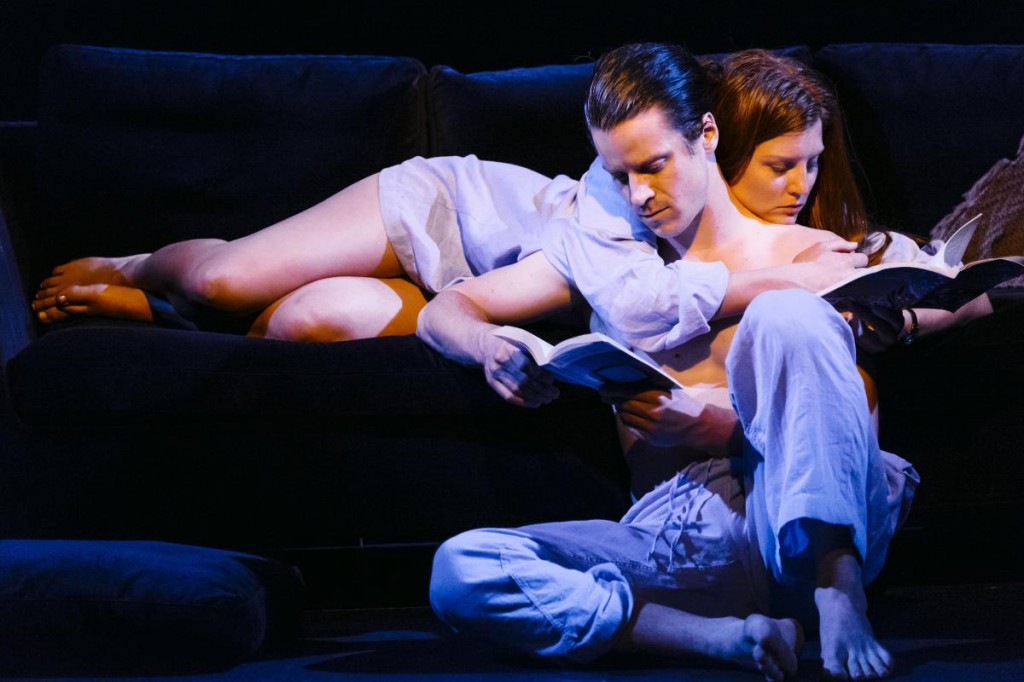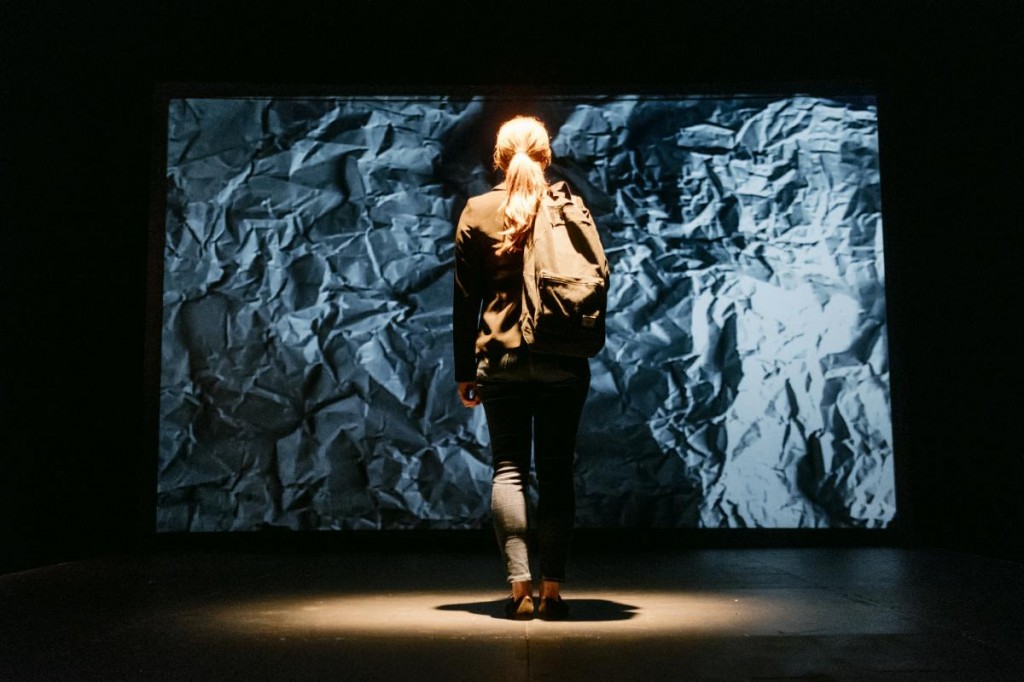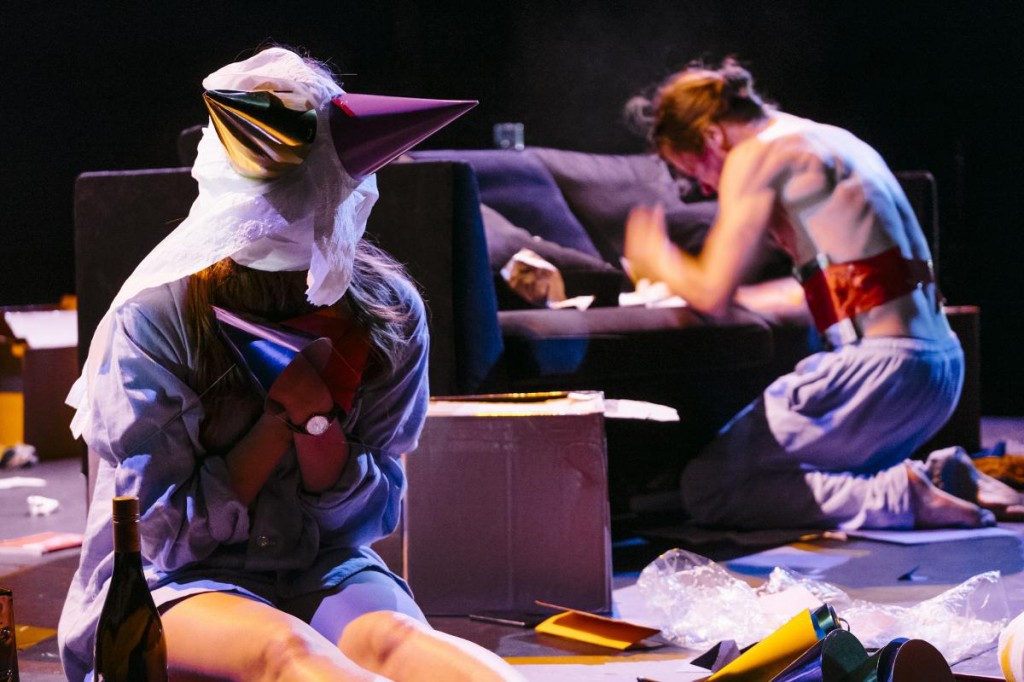
Credit: Renaud Phillipe
At Studio 16 until October 29, 2016
604-736-2616/seizieme.ca
Posted October 22, 2016
I’ve always liked the French phrase “mise-en-scène” indicating the one who takes the script and ‘puts’ or ‘places’ it on stage; in English, we call that the director. But never before have I so clearly felt the ‘putting’ of a script on stage as I did while watching Straight Jacket Winter.
The story is actually Gilles Poulin-Denis and Esther Duquette’s (artistic director of Théâtre la Seizième) who left their home on Rue Dorion, Montreal, in 2011 after joyfully and noisily celebrating New Year’s Eve with friends and family. Funny hats and much “Bonne Année”-ing.

Credit: Renaud Phillipe
Esther arrived in grey, wet, dreary Vancouver in January and found a small apartment on Bute Street. Gilles came later, in May.
Gilles is bilingual; Esther was not. When contacting Shaw to hook up internet service, Esther discovered her telephone options were, apparently, English, Cantonese, Mandarin, Punjabi and Tagalog. She chose English; “Boot” Street, she kept repeating to a bewildered Shaw employee on the other end of the phone. “Ah, Bute Street.”
It’s a familiar story of isolation but the presentation is anything but familiar: Poulin-Denis and Duquette place Frédéric Lemay (as Gilles) and Julie Trépanier (as Esther) on stage as their surrogates. But Duquette and Poulin-Denis remain just offstage, in full view and in front of a lot of electronic gadgetry to deliver visual and aural effects: playing a vinyl record on a record player, projecting various items on a screen (like postcards, photographs, even a video of friends in Paris); now and again, they step up onto the stage and help shuffle furniture when Esther and Gilles move from Bute to another apartment. Sometimes they hand Lemay or Trépanier an item need in a scene, like a book or a box. And throughout, Duquette and Poulin-Denis step up to a microphone to deliver longer pieces of exposition en francais, of course. On Tuesdays, Thursdays and Saturdays there are English surtitles.
The staging, with exquisite lighting by Itai Erdal, is clever, playful and utterly charming.
As the winter wears on and the rain continues to fall, Esther and Gilles suffer severe cabin fever. Without friends and little money, they live within their four walls. They play Dictionary or speak to each other using only vowels. They read. They cuddle. And eventually they drive each other crazy.
What begins as a happy, romantic dance between an unhappy, adrift couple turns into a frantic grotesquerie as Lemay, in pointy hat and pyjama bottoms, prances, then gallops around the room, stopping now and again to do frenzied pushups. It is one of the most hilarious (at first) and saddest (finally) performances I’ve seen. Winter in Vancouver has put both of them in straight jackets: confined and miserable.

Credit: Renaud Phillipe
These are two – make that four – engaging performers. We are always aware of two couples: onstage Esther (strawberry blond and lovely Trépanier) and onstage Gilles (slim, ponytailed Lemay) and offstage Esther Duquette and offstage Gilles Poulin-Denis. The interaction between the four of them is sweet and intimate. The onstage characters are not merely stand-ins for the offstage couple; they are collaborators, interpreters, extensions of their creators.
The French have another phrase: mise-en-abîme that indicates a smaller image inside a larger image. What we see onstage is a smaller image of Duquette and Poulin-Denis’ experience of moving from East to West. It could be, however, the story of immigrants anywhere: isolated by language, culture and shared experience.
In the play, Gilles complains to Esther that theatre in Vancouver is boring and that Vancouver audiences leap to their feet for “crappy shows” that risk “no exploration of form”. Straight Jacket Winter, produced by Théâtre La Seizième, explores form in a huge way and, while doing so, charms the heck out of us. The tableau that brings the curtain down keeps the audience clustered around the stage in almost childlike wonder. It feels a little like Christmas.

